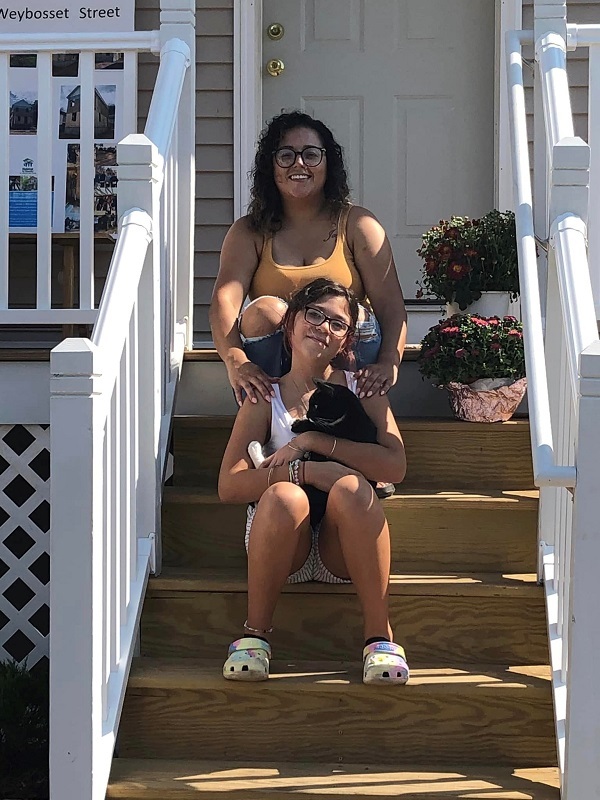A Home of Their Own: Habitat for Humanity Builds Homes, Stability for Families and Neighborhoods
New Haven chapter helps make housing affordable.

For Alicia Tirado and her daughter, Dalilah, it was a long eleven years when the two shared a cramped one-bedroom New Haven apartment. It had little privacy and was cold in the winter. “There wasn’t much insulation and the furnace couldn’t keep up,” Tirado said. “I was always debating turning up the heat versus the higher bills.” While she always dreamed of owning a home that would provide a better life for her daughter, the goal seemed out of reach. “It’s hard to qualify for a mortgage as a single parent with one income,” Tirado said.
Last year, however, the Tirados' fortunes turned brighter when they were selected as one of seven families to receive a home built for them by New Haven Habitat for Humanity.
Since the founding of the New Haven chapter in 1986, the organization has helped build or refurbish more than 150 homes in New Haven County, says Jennifer Rook, Co-Executive Director, who’s been with Habitat since 2002.
Over the past two decades, the demand for affordable housing has skyrocketed. At Habitat for Humanity, the Tirados were one of 178 families applying for the seven available homes. “We’re in the midst of an affordable housing crisis,” Rook said. “It’s a combination of extremely high – and increasing – rental costs and lack of housing inventory that’s affordable.” According to apartment.com data for New Haven, rental costs in the Elm City are up 4.9% for the year as of October 2023, with one- and two-bedroom apartments averaging $1,343 and $1,589 per month respectively.
With roughly 25% of New Haven’s population living in or slightly above poverty – $30,000 for a family of four – those rental costs often become a disproportionate percentage of many low-income families’ monthly budget. “Many [low-income renters] who contact our organization are paying 45-50% percent of their gross annual income for rent,” Rook explained. “That makes affording other necessities including food, clothing, medicine or saving for retirement far more difficult.”
As a volunteer-driven organization – with more than 2,000 volunteers – Habitat make affordable homes possible for families through new construction or renovating existing homes in disrepair. To qualify, recipients must meet certain criteria including financial requirements, like work history and credit score, a demonstrated need for housing and willingness to contribute 400 hours – or what Rook calls ‘sweat equity’ – in building their own home. They must also complete 25 hours of course work in homeownership – including budgeting, insurance, and saving.
Requiring homeowners to participate in the construction of their home alongside volunteers has several benefits, Rook says. “First of all, it shows families that the community cares about them and believes in them,” she said. “It also helps create a bond between the home and the homeowners.”
The program also helps homeowners to learn home maintenance skills during the construction process. While many volunteers – from schools, businesses and faith communities – are unskilled with home construction, all Habitat home-builds are overseen by licensed professional staff and subject to standard inspections. Habitat homes average 1,300 square feet with a minimum of 3 bedrooms and 1.5 bathrooms. While not a custom builder, Habitat will construct homes to address health-related conditions like asthma or accessibility issues related to disabilities.
Rook says her organization finances all Habitat-related mortgages which range from $96,000 to $125,000 over twenty-five years at 0 percent interest. “Typically, families pay about $380 a month before taxes and insurance,” Rook said. The organization also has provisions that require Habitat homes can only be sold to low-income families and must be homeowner occupied, but Rook says Habitat home sales seldom happen. “For families who build their home, these are their castles,” Rook added.
With a budget of $2 million – largely funded by private donations – Habitat typically builds and finances 4 to 6 homes in New Haven County annually. To supplement fundraising and offset rising construction costs, which are up 30% over last year, Rook says, the organization operates a Wallingford-based consignment store, called ReStore. Founded in 2013, the store primarily sells donated furniture and home goods with proceeds supporting the construction of one or two homes per year.
Rook says that Habitat targets particular streets for revitalization. Not only do new homes create a tax source for the city, but they also help create more stable communities. “When we build enough homes together, homeowners can support one another, form neighborhood watch groups, and can change a specific area for the better.”
Similarly, Habitat families like Alicia and Dalilah Tirado – who moved into their new home in early 2023 – see positive benefits, too, in owning a home. “With a stable home, families can create dependable budgets and achieve more economic and family stability,” Rook said. “They often pursue additional education or job training, connect more with extended families, and achieve better health and educational outcomes and greater general happiness.”
After 11 years in a tiny apartment, Delilah – now a 7th grader -- has her own room, a backyard for the first time ever, and most importantly dependable heat for the winter. “Everything I do is for my daughter,” Alicia said. “She is the center of my world and I want her to have what I didn’t.”
What inspires you?
